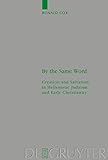By the Same Word : Creation and Salvation in Hellenistic Judaism and Early Christianity / Ronald Cox.
Material type: TextSeries: Beihefte zur Zeitschrift für die neutestamentliche Wissenschaft ; 145Publisher: Berlin ; Boston : De Gruyter, [2009]Copyright date: ©2007Description: 1 online resource (392 p.)Content type:
TextSeries: Beihefte zur Zeitschrift für die neutestamentliche Wissenschaft ; 145Publisher: Berlin ; Boston : De Gruyter, [2009]Copyright date: ©2007Description: 1 online resource (392 p.)Content type: - 9783110193428
- 9783110212143
- Cosmology -- History
- Creation in rabbinical literature
- Creation -- Biblical teaching
- Creation -- History of doctrines -- Early church, ca. 30-600
- Creation -- History of doctrines
- Gnosticism -- History
- Jews -- Civilization -- Greek influences
- Judaism -- History -- Post-exilic period, 586 B.C.-210 A.D
- Mediation between God and man -- Christianity
- Mediation between God and man -- Judaism
- Neoplatonism
- Salvation -- Biblical teaching
- Salvation -- Christianity -- History of doctrines -- Early church, ca. 30-600
- Wisdom literature -- Criticism, interpretation, etc
- Gnosis
- Heilige Schriften
- Juden /Alte Geschichte
- Neues Testament
- Platonismus
- RELIGION / Biblical Criticism & Interpretation / New Testament
- Gnosticism
- Judaism
- New Testament
- Philosophy (Middle Platonism)
- 220.6 261.26
- BS680.C69
- online - DeGruyter
- Issued also in print.
| Item type | Current library | Call number | URL | Status | Notes | Barcode | |
|---|---|---|---|---|---|---|---|
 eBook
eBook
|
Biblioteca "Angelicum" Pont. Univ. S.Tommaso d'Aquino Nuvola online | online - DeGruyter (Browse shelf(Opens below)) | Online access | Not for loan (Accesso limitato) | Accesso per gli utenti autorizzati / Access for authorized users | (dgr)9783110212143 |
Dissertation University of Notre Dame 2005.
Frontmatter -- Contents -- Chapter One. Introduction -- Chapter Two. Middle Platonic Intermediary Doctrine -- Chapter Three. Salvation as the Fulfillment of Creation: The Roles of the Divine Intermediary in Hellenistic Judaism -- Chapter Four. Salvation as the Reparation of Creation: The Roles of the Divine Intermediary in New Testament Christology -- Chapter Five. Salvation as the Undoing of Creation: The Roles of the Divine Intermediary in “Gnosticism” -- Chapter Six. Conclusion -- Backmatter
restricted access online access with authorization star
http://purl.org/coar/access_right/c_16ec
Middle Platonism explained how a transcendent principle could relate to the material world by positing an intermediary, modeled after the Stoic active cause, that mediated the supreme principle’s influence to the world while preserving its transcendence. Having similar concerns as Middle Platonism, Hellenistic Jewish sapientialism, early Christianity, and Gnosticism appropriated this intermediary doctrine as a means for understanding their relationship to God and to the cosmos. However, these traditions vary in their adaptation of this teaching due to their distinctive understanding of creation and humanity’s place therein. The Jewish writings of Philo of Alexandria and Wisdom of Solomon espouse a holistic ontology, combining a Platonic appreciation for noetic reality with an ultimately positive view of creation and its place in human fulfillment. The early Christians texts of 1 Cor 8:6, Col 1:15-20, Heb 1:2-3, and the prologue of John provide an eschatological twist to this ontology when the intermediary figure finds final expression in Jesus Christ. Contrarily, Poimandres (CH 1) and the Apocryphon of John, both associated with the traditional rubric “Gnosticism”, draw from Platonism to describe how creation is antithetical to human nature and its transcendent source.
Issued also in print.
Mode of access: Internet via World Wide Web.
In English.
Description based on online resource; title from PDF title page (publisher's Web site, viewed 28. Feb 2023)


